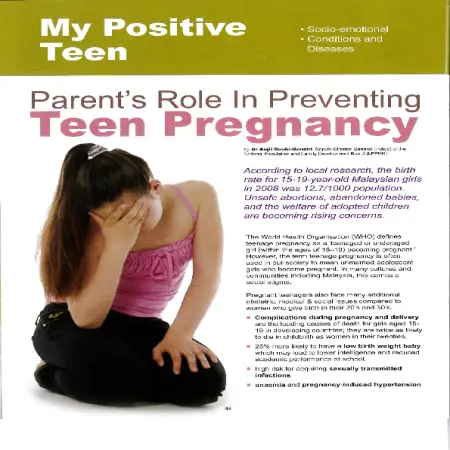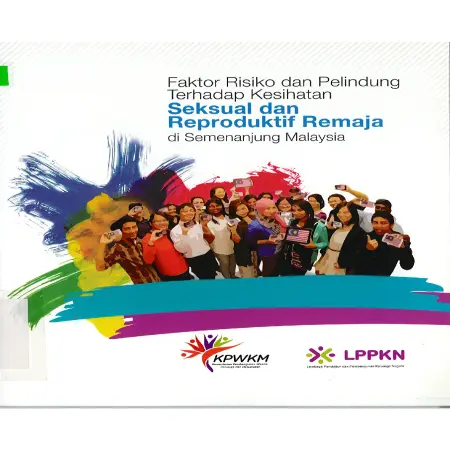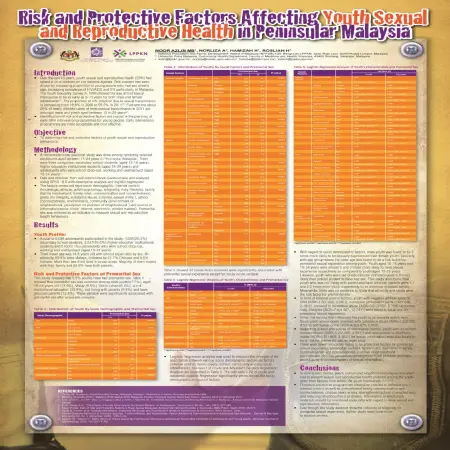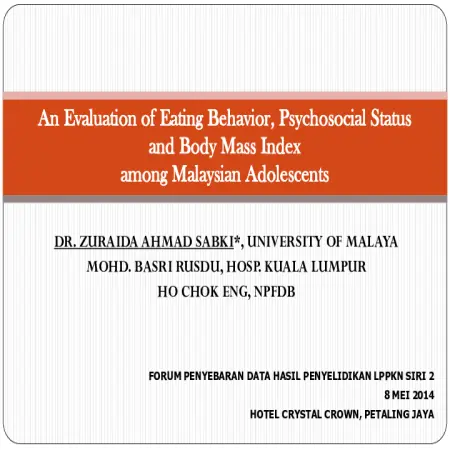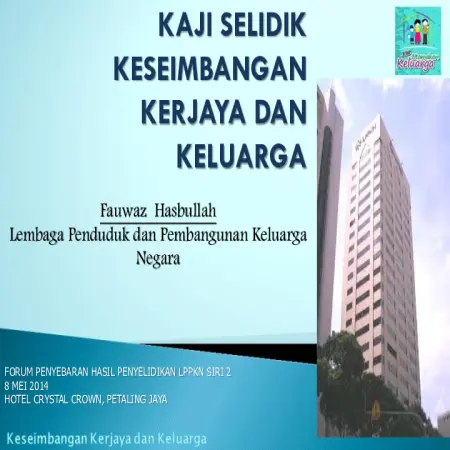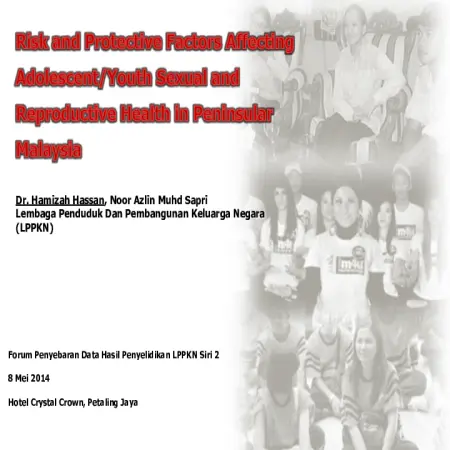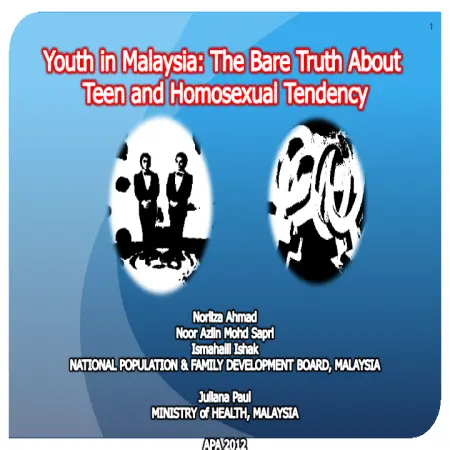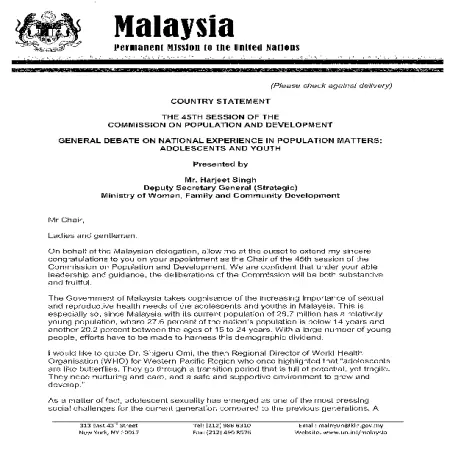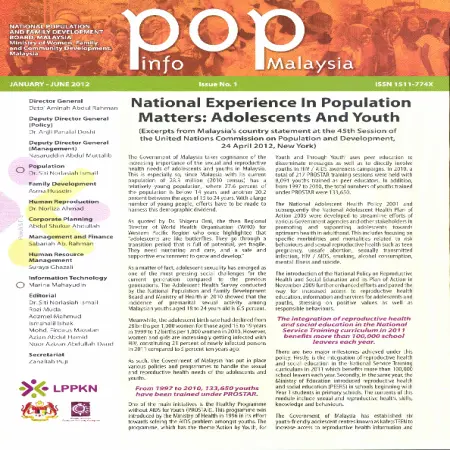TOPICS
Results for Topics : "Adolescent"
|
|
Parent's role in preventing teen pregnancy
Item Type: Article
Editor:
Year: 00/00/2015
Abstract: The World Health Organisation (WHO) defines teenage pregnancy as a ‘teenaged or underaged girl (within the ages of 15–19) becoming pregnant.’ However, the term teenage pregnancy is often used in our society to mean unmarried adolescent girls who become pregnant. In many cultures and communities including Malaysia, this carries a social stigma.
Pregnant teenagers also face many additional obstetric, medical & social issues compared to women who give birth in their 20’s and 30’s.
|
|
|
|
|
|
Faktor risiko dan pelindung terhadap kesihatan seksual dan reproduktif remaja di Semenanjung Malaysia
Item Type: Research Report
Editor:
Year: 00/00/2015
Abstract: In Malaysia, statistics from the National Registration Department (NRD) show that a total of 214,033 illegitimate children were born from 2004 to 2009. While statistics from the Royal Malaysia Police (RMP) show that 596 cases of baby abandonment were reported from 2005 to 2013. For the total number of rape crimes in among teenagers under the age of 18, PDRM statistics show an increase from 1,710 cases in 2006 to 2,658 cases in 2013. The increase in such cases shows that today's teenagers face the problem of moral decay and fragility of identity which is a concern of Malaysian society. Accordingly, knowledge of sexual and reproductive health can help adolescents avoid negative symptoms such as cases of extramarital pregnancies and social symptoms related to sexuality. The objective of this study was to (i). to study the prevalence of unhealthy sexual behavior among adolescents aged 13-24 years in peninsular Malaysia; (ii). identify risk factors related to adolescent sexual and reproductive health (ASRH); and (iii). identify protective factors related to ASRH. This study was implemented using two (2) main approaches, namely quantitative and qualitative methods. The design of the quantitative study was successfully conducted on 5,088 adolescents aged 13 to 24 years. The qualitative study involved a total of eight (8) Focus Group Discussions (FGD) conducted in eight (8) selected detention centers and shelter hostels located in several states in Peninsular Malaysia.
|
|
|
|
|
|
Risk and protective factors affecting youth sexual and reproductive health in Peninsular Malaysia
Item Type: Scientific Poster
Editor:
Year: 00/01/2014
Abstract: Over the last 10 years, youth sexual and reproductive health (SRH) had raised a lot of concern on the national agenda. This concern has been driven by increasing proportion of young people who had sex at early age, increasing prevalence of HIV/AIDS and STI particularly in Malaysia.
|
|
|
|
|
|
An evaluation of eating behavior, psychosocial status and body mass index among Malaysian adolescents
Item Type: Conference or Workshop Item
Editor:
Year: 00/00/2014
Abstract: This study is an attempt to produce an abbreviated Malay version of Weight and Lifestyle Inventory (MWALI), as an evaluation tool to assess eating and related bio-psychosocial factors among adolescents attending kafe@TEEN, Kuala Lumpur. The MWALI was translated ‘forward–backward’ from English to Malay and then administered to 135 adolescents to assess the factor construct of the eating behaviour and its relationships with the demographic profile, dysphoria, global self-esteem and body mass index (BMI). The exploratory factor analysis of the eating behaviour yielded five factors are Negative Emotion, Poor Impulse Control, Social Cues, Snacking and Early Meals in relation to over-eating which were significantly and positively correlated with BMI. Eating in response to Social Cues was negatively correlated with self-esteem, overeating at Early Meals was positively correlated with dysphoria. Female has significantly higher mean score of eating in response to Negative Emotion and eating in response to Social Cues. MWALI is appropriate for assessing eating behaviour and associated bio-psychosocial factors among overweight and obese adolescents in the primary care setting in Malaysia.
|
|
|
|
|
|
Kajian keseimbangan kerjaya dan keluarga
Item Type: Conference or Workshop Item
Editor:
Year: 00/00/2014
Abstract: The main objective of this study is to investigate the time arrangement between career and family among working peoples. This study leads to identifying the trend of work and family life balance in today’s families. As the result of this study, average time spent by respondent on working hour is 9 hours and 36 minutes per day, 48 hours 3 minutes per week. That duration is approach the result of the International Labor Organization ( ILO ) in 2000 which is Malaysia was ranked the longest spend time for working after South Korea. The findings also obtained the annual leave by respondent was high (26 days per year) compared to some other countries in the world . The duration of travels time to work is not much different in urban areas where respondents took 46 minutes commuting to work and the respondent metro-urban was takes about 55 minutes. This phenomena was influence the time management in their family life daily. The average time of sleep duration about 6 hours 41 minutes. Which is respondent went to sleep at 11:07 pm and wake up at 5:43 am by average. An important aspect of work-life balance is the amount of time a person spends at work. Overall in average in OECD Country, men spend more hours in paid work and the percentage of male employees working very long hours across OECD countries is 12%, compared with less than 5% for women. Finding a suitable balance between work and life balance is a challenge for all employee, especially working parents. The amount and quality of leisure time is important for people’s overall well-being, and can bring additional physical and mental health benefits. A full-time worker in the OECD works 1765 hours a year and devotes 62% of the day on average or close to 15 hours, to personal care (eating, sleeping and others) and leisure (socialising with friends and family, hobbies, games, computer and television use and others).
|
|
|
|
|
|
Risk and protective factors affecting adolescent youth sexual and reproductive health in Peninsular Malaysia
Item Type: Conference or Workshop Item
Editor:
Year: 00/00/2014
Abstract: This study shows that over the last 10 years, youth sexual and reproductive health (SRH) had raised a lot of concern on the national agenda. According to the statistics, age at first sexual intercourse to be as early as 9-10 years for both male and female adolescents (The Youth Sexuality Survey, 1996). The proportion of HIV infection due to sexual transmission is increasing from 18.8 % in 2000 to 55.5 % in 2011. About 26 % of newly infected cases of heterosexual transmission in 2011 are among teens and youth aged between 13 to 29 years. This study is to determine the prevalence of SRH behaviours of adolescent/youth and to identify risk and protective factors that influence adolescent/youth sexual reproductive health in Peninsular Malaysia.
|
|
|
|
|
|
Youth in Malaysia: the bare truth about teen and homosexual tendency
Item Type: Conference or Workshop Item
Editor:
Year: 01/07/2012
Abstract: Sexuality is a result of the interplay of biological, psychological, socio-economic, cultural, ethics and religious/spiritual factors. Youth sexuality, particularly homosexuality has always been a matter of concern to many parties. Furthermore, the issue of homosexuality has already caused much controversy in Malaysia recently. This study aims to explore the homosexual tendency among Malaysian youths. Methods a nationwide cross sectional study was done using secondary data from Adolescent Health Screening Forms (BSSK/R/1/2008). Data was obtained from randomly selected participants of a national youth programme aged between 18-25 years and was analyzed using SPSS. Results A total of 22,750 youth participated with almost equal ratio by sex. Mean age was 19.0 years old. This study revealed that the homosexual tendency was more common amongst male youths (4.1%), 21-24 years old (5.5%) and no formal education (6.1%). There is a relationship between homosexual tendency and sex, ethnicity and educational attainment. Homosexual tendency was found to be significantly associated with risky behavior, abuse, anti-social behavior, substance abuse and family connectedness. Multivariate analysis using logistic regression found that homosexual tendency was two times higher among abused youth followed by youth with anti-social (OR=1.9), risky behavior (OR=1.6), lack of family connectedness (OR=1.7), less religious (OR=1.4) while controlling for age, ethnicity and education level. Conclusion, the prevalence of homosexual tendency among youths in Malaysia is an alarming issue and many cases are still under-reported. Misunderstanding and a lack of information on sexual diversity have caused a concern for many, as there is a tendency for judgments, stereotypes, discrimination and prejudice towards homosexuality in society. Instead of treating it as a disease, ways and measures of educating youths need to be explored.
|
|
|
|
|
|
The 45th session of the Commission on Population and Development at the general debate on national experience in population matters: adolescents and youth, New York, 24th April, 2012
Item Type: Country Statement
Editor:
Year: 00/04/2012
Abstract: The Government of Malaysia takes cognisance of the increasing importance of sexual and reproductive health needs of the adolescents and youths in Malaysia. Since Malaysia with its current population of 28.7 million has a relatively young population, where 27.6 percent of the nation's population is below 14 years and
another 20.2 percent between the ages of 15 to 24 years. With a large number of young people, efforts have to be made to harness this demographic dividend.
|
|
|
|
|
|
National experience in population matters: adolescents and youth
Item Type: Newsletter
Editor:
Year: 00/00/2012
Abstract: Adequate and accurate sexual and reproductive health information helps young people to make informed and responsible decisions. Howewer, cultural and religious sensitivities within the communities remain one of the major challenges in implementing reproductive health education for young people. Parents are still uncomfortable talking about reproductive health matters with their children ,leaving their children dependent upon information from their peers or other sources like the internet. The Government of Malaysia takes cognisance of the increasing importance of the sexual and reproductive health needs of adolescents and youth in Malaysia. Hence, the Government of Malaysia has put in place various policies and programmes to handle the sexual and reproductive health needs of the adolescents and youths. One of the main initiatives is the Healthy Programme without AIDS for Youth (PROSTAR). The Government of Malaysia also has established six youth-friendly adolescent centres known as kafe@TEEN to increase access to reproductive health information and services for young people aged 13 to 24 years.
|
|
|
|
|
|
Kajian Penilaian Modul Pendidikan Kesihatan Reproduktif dan Sosial (PKRS) dalam kalangan Pelatih PLKN
Item Type: Research Report
Editor:
Year: 00/00/2011
Abstract: Adolescents are the future leaders of the country and have a huge influence on the social, economic and political situation of the country. However, with the presence of various social problems that plague teenagers today, it is feared that it will affect their future which in turn is detrimental to the country. The Ministry of Women, Family and Community Development (MWFCD) has taken the initiative by developing the Reproductive and Social Health Education Policy and Action Plan (PKRS) which aims to produce individuals who are knowledgeable and have a positive attitude in the field of reproductive and social health. Under this PKRS program, the National Population and Family Development Board (NPFDB) is one (1) of the agencies that implement the program. In line with the implementation of this policy, the National Service Training Council has agreed with MWFCD's proposal for PKRS to be implemented in PLKN. Following that, NPFDB has implemented one (1) Pre and Post Test Study to trainees to assess the level of knowledge and perception on reproductive and social health before and after the teaching of this PKRS module is conducted. This study also aimed to examine the sexual and reproductive behaviors of trainees.
This study was conducted in 2011 in a cross section on PLKN Trainees aged 17 years and above in selected National Service Training Camps in Malaysia using independent random sampling. The total sample required was 1,038 people. The calculation of this sample size is based on an estimated 31,200 PLKN trainees who are required to attend training using Confidence Interval (95%), Margin of Error (1.5%) and Prevalence of Having Sex Out of Wedlock Among Adolescents (6.5%), (Naing L, 2006). Questionnaires were developed according to the needs and objectives of the study. One-third of the questions of this questionnaire were adapted from an international study, namely the Youth Risk Surveillance Survey, 2011 but adapted according to the objectives of the study and the culture of the community in Malaysia. The method of questionnaire administration was self administered. The scope of the questionnaire covers three (3) domains namely demographic information, knowledge and attitudes towards reproductive and social health as well as adolescent sexual behavior. A total of 1,300 pieces of assessment forms (pre and post -test) were distributed during the first teaching session of the module. Of that number, only 1,063 forms were received for analysis. After the initial analysis was conducted, it was found that there were some questions that were not fully answered by the respondents. Therefore, the data analysis will vary according to the number of participants who answered for each section. In total, a total of 1,063 respondents were successfully covered in 13 training camps nationwide.
The results of the descriptive analysis showed that the respondents consisted of 57.8% male adolescents and 42.2% female. The majority of respondents were aged between 17 to 19 years (95.6%) with a mean age of around 18 years. Based on the ethnic composition, 66.7% are Malays, 15.3% Chinese, 4.2% Indians and 13.8% are other ethnicities including Sabah and Sarawak Bumiputera. Most respondents have SPM education (95.6%) and are unmarried (99.6%).
The overall findings of the study can be summarized that the level of respondents' knowledge on reproductive and sexual health increased significantly (p <0.05) after undergoing the PKRS module with an increase in mean knowledge score of 7.04±2.2 (before undergoing the module) to 9.17±2.1. A total of 71.1% of respondents obtained a score of 9 out of 12 items (75.0%) and above after undergoing the module. There was a significant change in attitudes (p <0.05) on reproductive and social health after undergoing PKRS training. This indirectly shows that this PKRS module seeks to help respondents change their attitudes in a more positive direction.
A total of 10.4% of respondents admitted to having had sex. The mean age of having sex for the first time is about 15 years. 45.5 percent of them had sex with more than one partner. Only 2.1 percent admitted to being sexually attracted to the same sex with 18.2% of them admitting to having had same -sex sex.
|
|
|
|





